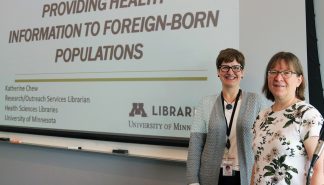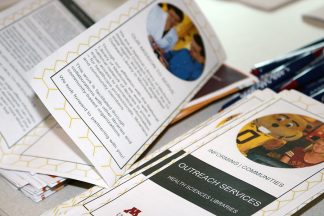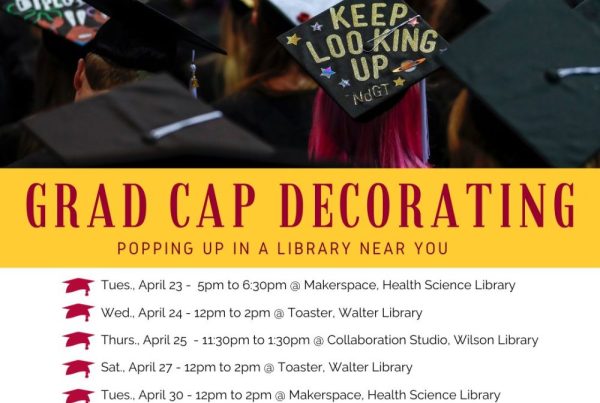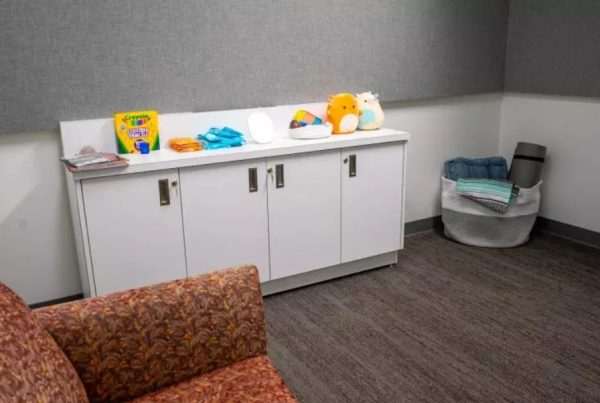By Amy Claussen
Earlier this month, Outreach Librarian Katherine Chew stepped off campus to provide health information training for public librarians.
As the National Network of Libraries of Medicine-designated Outreach Library for the state of Minnesota, the Bio-Medical Library provides biomedical information for health care professionals, librarians, and community members wherever they are located. Chew collaborates with community partners to provide health information and health literacy training.
Building relationships with community partners
Outreach activities are evolving to meet the unique needs of an increasingly diverse population of health consumers statewide.
As Chew points out, “Our focus is on providing instruction for health organizations, public and school libraries, community centers, and faith-based organizations.” Course content is tailored to meet the needs of the intended audience and emphasis is placed on high quality resources from the National Library of Medicine and the National Institutes of Health.
Providing health information to foreign-born populations
As part of her outreach role, Chew recently had the opportunity to speak to Ramsey County Library staff in Roseville and share health information resources for immigrants and refugees.
Tuberculosis, Hepatitis B, Parasitic infections, and Malaria are some of the health issues that immigrants and refugees may be dealing with upon arriving in Minnesota. Public libraries play a vital role in connecting immigrants to accurate, quality information about health and wellness in their native languages. Chew calls attention to cultural competency awareness and mindfulness of language and communication barriers in her discussion with public library staff.
Jason Lyons, a Librarian at Ramsey County Library in Roseville, attended the training sessions. “Now more than ever we need to make our public libraries a welcome place for new immigrants,” Lyons said. “Katherine’s presentation not only provided an excellent demonstration of online health information resources, but also gave definitions and a snapshot of current immigrants and refugees within our community and the health issues they encounter.”
Chew notes that Minnesota’s population is becoming more diverse in terms of languages spoken. “As languages other than English multiply, it will become increasingly important to offer information and services in these languages,” says Chew. “By teaching public librarians how to access quality, tested, and accurate multilingual health information, they help provide immigrant populations see improved quality of health care service, help reduce health disparities, and achieve health equity.”
Guidelines for evaluating websites for accuracy, authority, bias, currency, and culturally appropriate content are also presented. Participants are guided through hands-on exercises to become more comfortable handling health-related questions. Hypothetical scenarios such as — I am looking for information in Russian on autism for the family of a 17-year-old man — give library staff an opportunity to apply the knowledge they have learned and receive immediate feedback.
Connecting older adults to health information
Public libraries continue to address more health related questions from seniors and their caregivers. To support this need, Chew provides specific training and resources targeted to the health needs and challenges of older adults. Health literacy and internet usability are also highlighted for this age group.
Lyons remarked that he has seen an increased number of health related question from older adults and that the content was very timely. “Katherine’s presentation provided front line reference staff with a list of authoritative online health resources for the older adult,” he said.
By 2030, 25 percent or 60,000 Minnesota adults will be 65 or older, said Chew. She adds that they face cognitive, visual, and hearing challenges when it comes to finding and understanding healthcare information.
“Enabling public librarians is critical to helping seniors overcome these challenges to effectively navigate and utilize the healthcare information they need to stay healthy,” Chew said.
Collaboration is key to successful library programming
Chew emphasizes that libraries can create valuable partnerships with organizations in the community when planning and delivering programming to growing senior populations. Combining resources and local expertise is key to successful library programs.
If you are interested in community partnerships with the Bio-Medical Library, contact Katherine Chew, Outreach Services Librarian to learn more and to arrange health information training workshops.
Upcoming outreach programs
- Minnesota State Fair goers can visit the Bio-Medical Library at the Minnesota State Fair in the Driven To Discover facility Monday, August 28, from 9:00 a.m. to 3:00 p.m.
- In October a workshop on identifying fake health news for librarians will be held at the Minnesota Library Association’s annual conference.
- The National Library of Medicine science resources workshop for the Minnesota Science Teachers Association (MnSTA) will be held in November.
Selected health resources for foreign-born populations
- Health Information Translations has plain language health education resources for health care professionals and others working in communities with limited English proficient populations.
- MedlinePlus and HealthReach provide accurate, quality multilingual health information. Culturally relevant information about health conditions and wellness are available in multiple languages and formats. (U.S. National Library of Medicine)
- EthnoMED is a joint program of the University of Washington Health Sciences Libraries and Harborview Medical Center’s Interpreter Services Department. Patient education topics in multiple languages, clinical topics, cross-cultural health and a calendar of religious holidays or other observances which might affect health care of immigrants and refugees.
Selected resources from the National Institute on Aging
- Training Materials for Professionals offers free access to clinical practice tools, training materials and other resources geared towards physicians, nurses, social workers, and other professionals on a range of health topics.
- Health & Aging Publications provides fact sheets, eBooks, AgePages and more publication formats on health concerns for older adults available in Spanish and other languages.
- NIA Information on Legal and Financial Planning is a source for publications and resources for better planning for later life.






